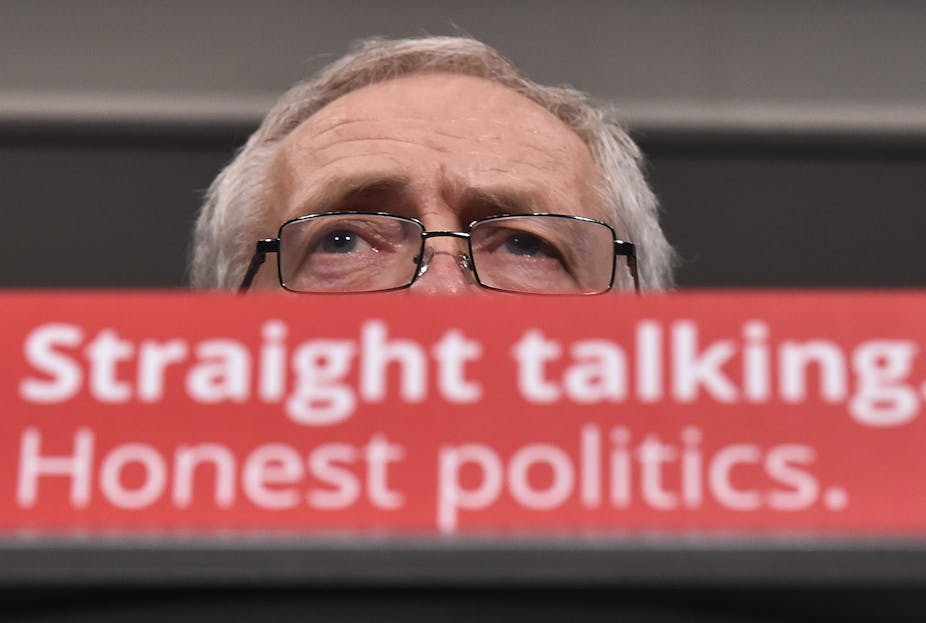After being called the “most dangerous man in British politics”, Labour leader Jeremy Corbyn decided to use his first party conference in Brighton to show he is as normal and British as a cup of milky tea – despite his record as a radical socialist.
Considering Labour’s catastrophic defeat in the last election, this may appear a very modest goal – but Corbyn needs to clear this hurdle before he can even begin to convince sceptic voters in marginal seats to support his agenda. So, Brighton was as much about reassuring the wider public about the “normalcy” of his politics as it was celebrating his election as Labour leader.
When he arrived on stage to deliver his first conference speech he looked relaxed and personable. His self-deprecating tone was well received by the very sympathetic audience in the conference hall. He tried to make the most of the lack of unity within the shadow cabinet by showing that he was open to discussing issues – to persuade and be persuaded.
He also declared his commitment to bottom-up “new politics”, and to a “kinder” Britain but was equally clear about his red lines. Fighting austerity, defending the welfare state, campaigning for human rights, and voting against the renewal of Trident are issues on which he will not compromise, regardless of the views of the shadow cabinet.
Calm down, dears
Interestingly, one of the words Corbyn used several times throughout his speech was “security”. This is not a word that often appears in the lexicon of die-hard socialists but by using it he was trying to respond to David Cameron’s accusation that he represents a “threat to national security”. In his speech Corbyn used the word to contrast his own proposals on benefits, housing, social care, new rights for the self-employed against those of the Conservatives. The latter, he suggested are “the real risk to economic and family security”.
This reassurance strategy was also on display when shadow chancellor John McDonnell took to the stage. He promised a boring speech and presented himself as a reassuringly dull bank manager. He failed on the promise to be dull, but his narrative and proposals were miles away from the fiery rhetoric to which he traditionally treated his audiences.
He sounded reasonable, pragmatic and open to compromise. In truth, McDonnell’s still undeveloped proposals sounded more like a renewal of Milibandism than Marx’s plans to overthrow capitalism. He even promised to tackle the deficit – though not through austerity but by raising taxes and stimulating economic growth.
McDonnell also announced a number of reviews chaired by the always reassuring figure of the “former civil servant”. So, Bob Kerslake was appointed to lead an investigation into whether the Treasury works efficiently.

The climax of McDonnell’s reassurance mission came when he revealed the list of economists who have joined Labour’s Economic Advisory Committee. No one will be able to say that the party’s policies are bonkers when they’ve been scrutinised by a team of that includes Nobel prize-winner Joseph Stiglitz, the popular French economist Thomas Piketty, Danny Blanchflower, a former member of the Bank of England’s monetary policy committee, and respected academics Mariana Mazzucato and Anastasia Nesvetailova.
The reassurance strategy was helped by the general mood of the conference. Delegates seemed to love the “let a thousand flowers bloom” theme and were energised by the promise that another kind of politics is possible. There were no major mishaps or PR disasters (other than accusations that Corbyn read a recycled speech).
In addition, the headlines in the right-wing press have been toned down somewhat, maybe in an expression of reluctant goodwill towards the new Labour leader.
Even Corbyn’s critics in the party have softened their attacks. Instead of plotting an instant coup, the right and centre of the party issued a polite deadline to the Labour leader. He has until May – when elections in Scotland, Wales, London, and local councils in England will take place -– to show that he can turn around Labour’s electoral prospects. But for that to happen Corbyn will have to do far more than just offering reassurance.

